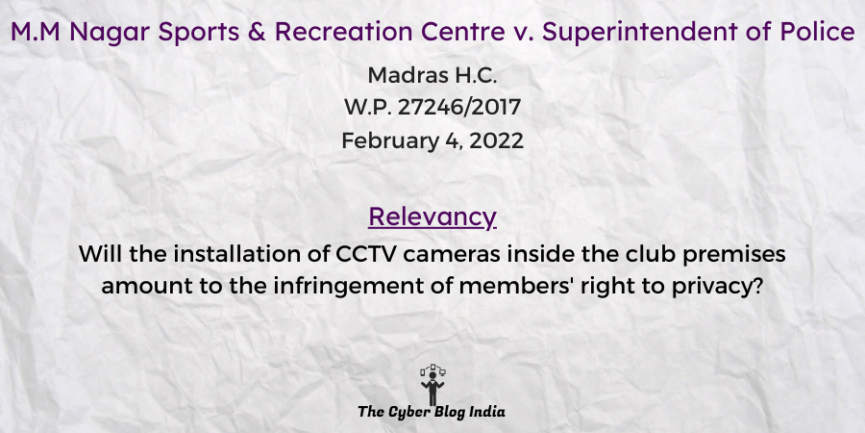M.M Nagar Sports & Recreation Centre v. Superintendent of Police

M.M Nagar Sports & Recreation Centre v. Superintendent of Police
In the High Court of Madras
W.P. 27246/2017
Before Justice Krishnan Ramasamy
Decided on February 4, 2022
Relevancy of the case: Will the installation of CCTV cameras inside the club premises amount to the infringement of members’ right to privacy?
Statutes and Provisions Involved
- The Constitution of India (Article 14, 19, 21, 226)
- The Tamil Nadu Gaming Act, 1930 (Section 5)
Relevant Facts of the Case
- The petitioner clubs promoted social activities as well as intellectual advancement. The activities included indoor sports/games, namely chess, carrom, table tennis and playing cards.
- Frequent police raids led to grievances with the petitioners. Moreover, it had resulted in a disturbance of the peaceful functioning of the clubs.
- Thus, to strike a balance between the club and the police, the court suggested the installation of CCTV.
- The Hon’ble court asked the Director-General of Police to submit a report.
- The report stated that the CCTVs must be installed everywhere on the club’s premises, barring the restroom/washrooms. The petitioners filed objections to the report.
Prominent Arguments by the Advocates
- The petitioner’s counsel argued that if CCTVs continuously watch members, they will infringe upon their right to privacy and make the patrons uncomfortable. He submitted that the police merely apprehending gambling in the club is not enough to constantly monitor the members.
- The petitioner’s counsel further submitted that section 5 of the Gaming Act contemplates that a police officer not below the rank of the Deputy Superintendent of Police can if he has reason to believe the existence of illegal activity, give authority to any police officer not below the rank of Sub-Inspector take action for the same. However, police, regardless of rank, enter the club premises and conduct the raids.
- The respondent’s counsel argued that the petitioner filed the writ petition only on the apprehension that the respondents would take action against them despite no illegal activities.
- They also submitted that installing CCTV cameras in all the areas, except for the restrooms, would be helpful to the respondents. They argued that gambling occurs in areas that CCTV cameras do not cover.
Opinion of the Bench
- Casting doubt on every club member and continuously monitoring them is undeniably irrational. Police suspicion cannot trump the right to privacy. Branding every person who avails of the club’s facilities as capable of committing an offence is not valid.
- The right to privacy includes the right to be left alone and the right to move around freely. Further, moving under the scrutiny of the police is not free movement. A member’s activity is available to the scrutiny of the police, making their privacy redundant.
- The legislature incorporated Section 5 of the Tamil Nadu Gaming Act, 1930 to safeguard the interests of the clubs’ members. However, the Deputy Superintendent or Assistant Commissioner must have real and substantial reasons to issue a warrant against the clubs.
- Installing CCTVs in all places except restrooms is not a reasonable restriction on the right to freedom.
- The court observed that officers not below the Deputy Superintendent or Assistant Commissioner rank should conduct the investigations.
Final Decision
- The court ordered the petitioners to install CCTV cameras, specifically at the entry and exit of the club and play areas. They should keep the CCTV footage for at least 30 days and make it available to the local police.
- The court disposed of the writ petition, with directions to the police to take action only after satisfying requirements under the Act.
Anjali Agrawal, an undergraduate student at the NALSAR University of Law, and Anjini Pandey, an undergraduate student at Dr. Ram Manohar Lohiya National Law University, prepared this case summary during their internship with The Cyber Blog India in May/June 2022.
